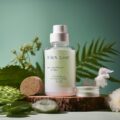Understanding Your Skin Barrier: Your Body’s First Line of Defense
Our skin is more than just a beautiful outer layer – it’s a complex organ that serves as our body’s first line of defense against the outside world. At the heart of this protective system is the skin barrier, a delicate yet powerful structure that keeps moisture in and harmful substances out. When we nurture and protect our skin barrier, we’re not just investing in our appearance, but in our overall health and wellbeing.
The skin barrier, also known as the stratum corneum, is the outermost layer of our skin. It’s made up of cells called corneocytes, held together by lipids. This structure is often compared to a brick wall, with the corneocytes as the bricks and the lipids as the mortar. When our skin barrier is healthy and functioning well, it helps our skin retain moisture, protects against irritants and allergens, and maintains a balanced pH level.
Signs of a Compromised Skin Barrier
Sometimes, due to various factors, our skin barrier can become damaged or weakened. This can lead to a range of skin issues and discomfort. Here are some signs that your skin barrier might need some extra care:
- Dryness, flakiness, or a feeling of tightness
- Increased sensitivity or irritation
- Redness or inflammation
- Itchiness or a stinging sensation
- Acne breakouts or other skin conditions flaring up
- Slow healing of wounds or increased susceptibility to infections
If you’re experiencing any of these symptoms, don’t worry. With some gentle care and attention, you can help your skin barrier recover and become stronger than ever.
Nurturing Your Skin Barrier: A Path to Radiant Health
Protecting your skin barrier isn’t just about using the right products – it’s about adopting a holistic approach to skincare that encompasses your lifestyle, diet, and overall wellbeing. Here are some compassionate ways to nurture your skin barrier:
- Be gentle with your skin: Avoid harsh scrubs or over-exfoliation. Treat your skin with kindness, using soft, circular motions when cleansing.
- Hydrate from within: Drink plenty of water throughout the day. Your skin needs hydration from the inside out.
- Nourish your body: Eat a balanced diet rich in omega-3 fatty acids, vitamins, and antioxidants. These nutrients support skin health from within.
- Protect from the sun: Use a broad-spectrum sunscreen daily, even on cloudy days. Sun damage can significantly weaken your skin barrier.
- Manage stress: High stress levels can impact your skin health. Practice stress-reduction techniques like meditation, yoga, or deep breathing exercises.
- Get enough sleep: Your skin repairs itself while you sleep. Aim for 7-9 hours of quality sleep each night.
Choosing Skin-Loving Products
When it comes to skincare products, less is often more. Look for gentle, fragrance-free products that support your skin’s natural functions rather than trying to drastically alter them. Here are some ingredients to look for:
- Ceramides: These lipids are naturally present in your skin and help to reinforce the skin barrier.
- Hyaluronic Acid: This powerful humectant helps to draw moisture into your skin.
- Niacinamide: This form of vitamin B3 can help to strengthen the skin barrier and improve overall skin health.
- Panthenol: Also known as pro-vitamin B5, this ingredient helps to soothe and hydrate the skin.
- Antioxidants: Ingredients like vitamin C and E can help protect your skin from environmental stressors.
Remember, everyone’s skin is unique. What works for one person might not work for another. Be patient and listen to your skin as you introduce new products.
The Power of Self-Care in Skin Health
Protecting your skin barrier isn’t just about what you put on your skin – it’s also about how you treat yourself. Self-care isn’t selfish; it’s an essential part of maintaining your overall health and wellbeing, which in turn reflects in your skin.
Take time each day to care for yourself. This might mean enjoying a relaxing bath, practicing mindfulness, or simply taking a few deep breaths. When you nurture your inner self, you’re also nurturing your skin.
Remember, your skin is unique and beautiful. Instead of striving for “perfect” skin, focus on having healthy, resilient skin that allows you to live your life to the fullest. Embrace your natural texture, celebrate your unique features, and treat your skin with the love and respect it deserves.
Frequently Asked Questions About Skin Barrier Protection
1. How long does it take to repair a damaged skin barrier?
The time it takes to repair a damaged skin barrier can vary depending on the extent of the damage and how well you care for your skin. Generally, with proper care, you may start to see improvements in 2-4 weeks. However, complete repair can take several months. Be patient and consistent with your skincare routine.
2. Can diet affect my skin barrier?
Yes, diet can significantly impact your skin barrier. A diet rich in omega-3 fatty acids, vitamins (especially A, C, and E), and antioxidants can help support skin barrier function. Stay hydrated and consider incorporating foods like fatty fish, nuts, seeds, fruits, and vegetables into your diet.
3. Is it possible to over-moisturize and damage the skin barrier?
While moisturizing is important for skin barrier health, it is possible to over-moisturize. Using too many heavy products can potentially clog pores or make your skin dependent on external moisture. Listen to your skin and adjust your routine as needed. If your skin feels greasy or congested, you might be over-moisturizing.
4. How does stress affect the skin barrier?
Stress can have a significant impact on skin health. It can increase inflammation in the body, which can weaken the skin barrier. Stress can also lead to behaviors that may damage the skin barrier, such as poor sleep or neglecting skincare routines. Managing stress through relaxation techniques, exercise, and self-care can help protect your skin barrier.
5. Can I use exfoliants if I’m trying to protect my skin barrier?
While exfoliation can be beneficial for skin health, it’s important to be gentle when trying to protect your skin barrier. If your skin barrier is damaged, it’s best to avoid exfoliants until it heals. Once your skin barrier is healthy, you can introduce gentle exfoliation 1-2 times a week. Always listen to your skin and stop if you notice any irritation.
Remember, caring for your skin barrier is a journey, not a destination. Be patient, be kind to yourself, and enjoy the process of getting to know and nurture your skin. Your skin is a reflection of your overall health and wellbeing, so when you care for your skin, you’re caring for your whole self.








